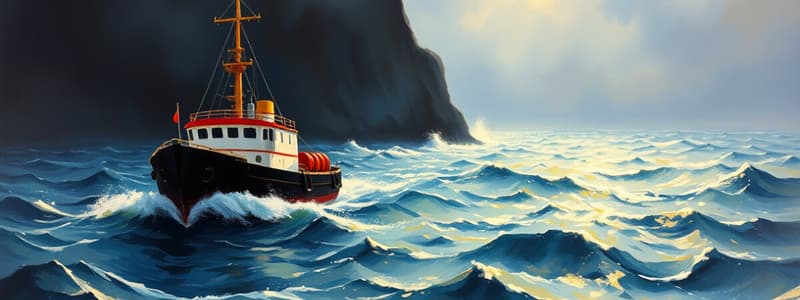Podcast
Questions and Answers
What is the main purpose of the SOPEP?
What is the main purpose of the SOPEP?
- To outline procedures for responding to oil spills. (correct)
- To monitor and report vessel emissions.
- To ensure vessel owners secure insurance for pollution incidents.
- To implement international shipping laws.
Which vessels are required to carry an approved SOPEP according to the SOPEP requirements?
Which vessels are required to carry an approved SOPEP according to the SOPEP requirements?
- Pleasure yachts over 200 gross tonnage.
- All fishing boats and small craft.
- Oil tankers of 150 gross tonnage and above. (correct)
- Cargo ships with a gross tonnage of 100 or more.
Which regulation mandates the preparation of Vessel Response Plans (VRP) and SOPEP?
Which regulation mandates the preparation of Vessel Response Plans (VRP) and SOPEP?
- MARPOL Annex II.
- The Clean Water Act.
- OPA-90. (correct)
- Oil Pollution Prevention Regulation.
What is required for the crew members according to the SOPEP?
What is required for the crew members according to the SOPEP?
What additional requirement does MARPOL Annex I impose regarding SOPEP?
What additional requirement does MARPOL Annex I impose regarding SOPEP?
Flashcards
SOPEP purpose
SOPEP purpose
Outlines procedures for responding to oil spills.
SOPEP vessel size requirement
SOPEP vessel size requirement
Oil tankers over 150 gross tonnage must have an approved SOPEP.
SOPEP regulation
SOPEP regulation
OPA-90 mandates Vessel Response Plans (VRP) and SOPEP.
Crew role in SOPEP
Crew role in SOPEP
Signup and view all the flashcards
MARPOL Annex I and SOPEP
MARPOL Annex I and SOPEP
Signup and view all the flashcards
Study Notes
OPA-90 (Oil Pollution Act of 1990)
- U.S. regulation mandating vessel owners/operators to create Vessel Response Plans (VRP) and/or Shipboard Oil Pollution Emergency Plans (SOPEP).
- Aims to prepare ships for oil pollution emergencies, ensuring rapid and effective response.
SOPEP Requirements
- Oil tankers with a gross tonnage of 150 or more must have an approved SOPEP on board.
- Non-oil tankers with a gross tonnage of 400 or more are also required to carry an approved SOPEP.
- MARPOL Annex I stipulates that all oil tankers of 150 gross tonnage and above, along with ships of 400 gross tonnage and above, must possess an approved SOPEP.
Purpose of SOPEP
- SOPEP details specific procedures for responding to oil spills, focusing on containment, cleanup, and incident reporting.
- It ensures that crew members receive training and are equipped to manage pollution incidents effectively.
Studying That Suits You
Use AI to generate personalized quizzes and flashcards to suit your learning preferences.




